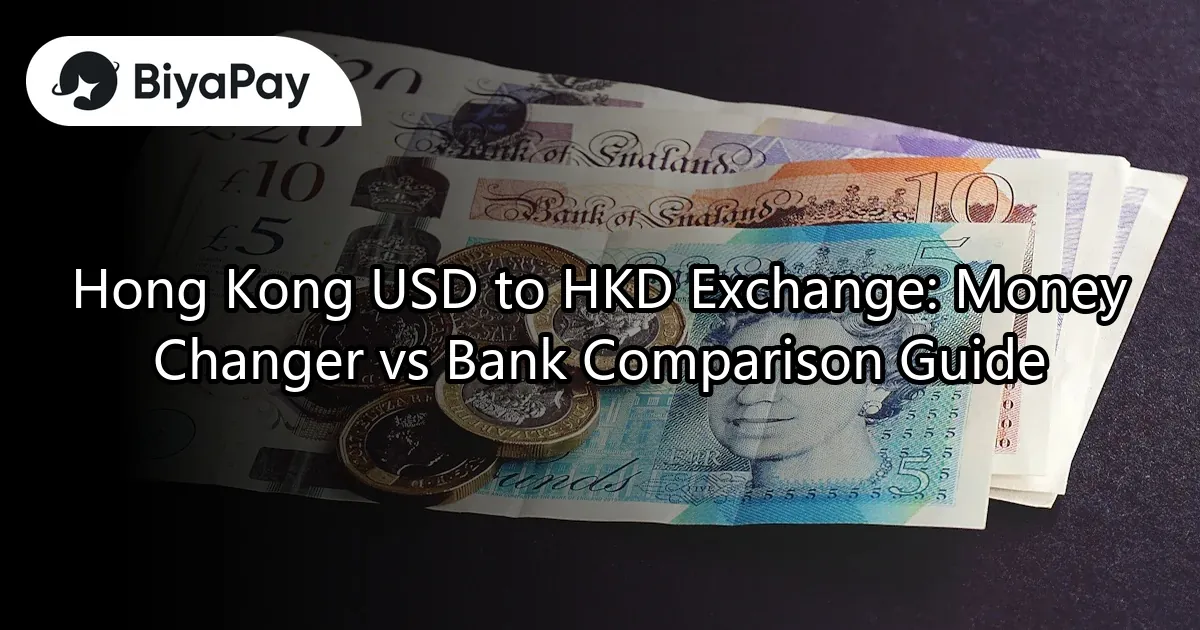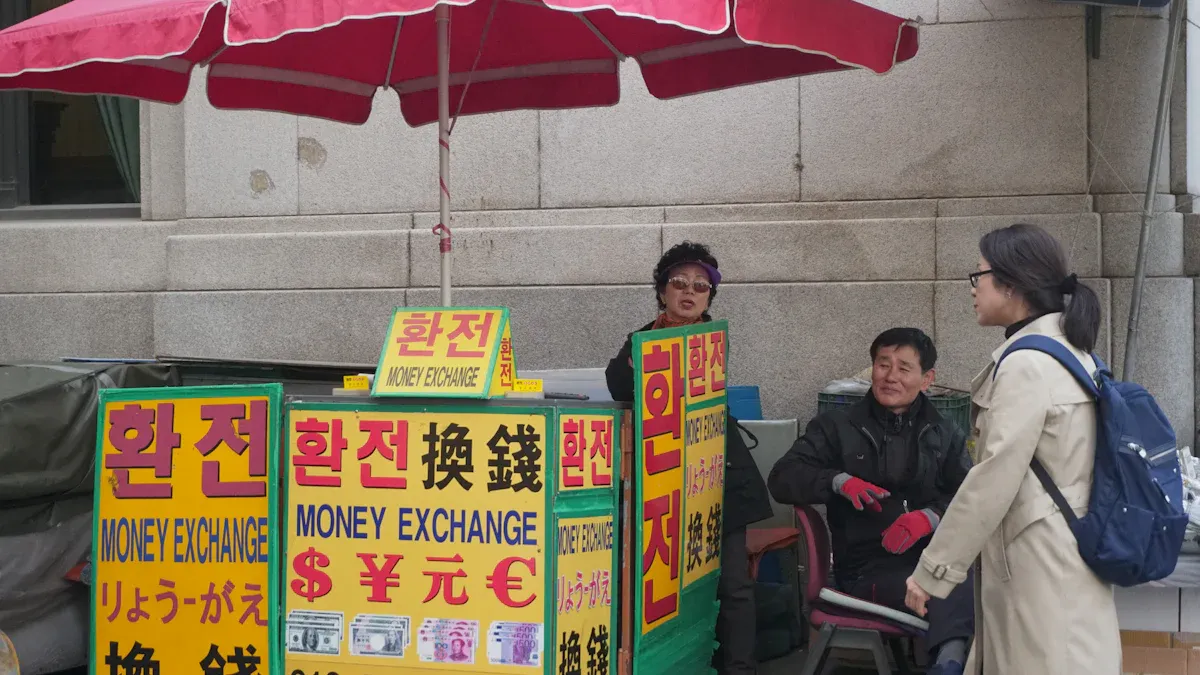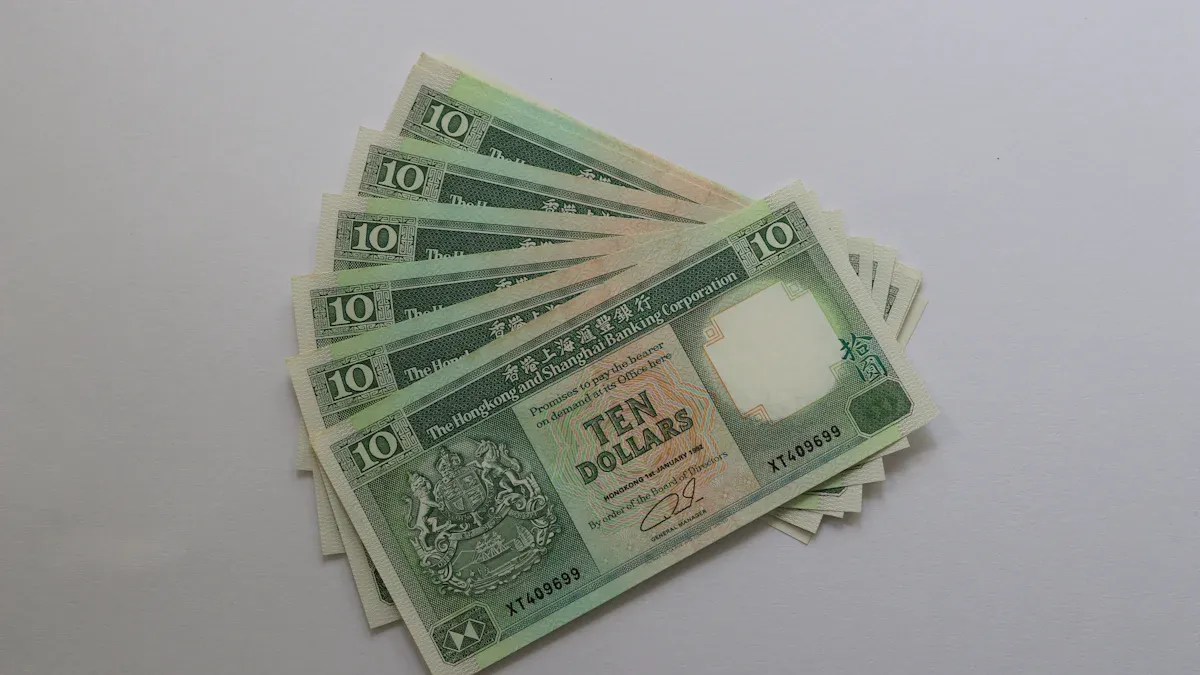- EasyCard
- Trade
- Help
- Announcement
- Academy
- SWIFT Code
- Iban Number
- Referral
- Customer Service
- Blog
- Creator
Hong Kong USD to HKD Exchange: Money Changer vs Bank Comparison Guide

Image Source: unsplash
If you want to exchange USD for HKD in Hong Kong, the most straightforward options are money changers or banks. You will find that money changers usually offer more attractive exchange rates, but banks provide higher security. You need to pay attention to exchange rates, fees, safety, and identification requirements. Whenever the exchange amount exceeds USD 1,000, the staff at money changers or banks will require you to present identification documents.
Key Points
- Money changers typically offer better exchange rates than banks and usually do not charge fees, making them suitable for small amounts and immediate exchanges.
- Bank exchanges are highly secure with recorded transactions, ideal for large amounts and users who prioritize fund safety.
- For exchange amounts of USD 8,000 or more, both money changers and banks require valid identification documents.
- Before exchanging, compare exchange rates, avoid peak market hours, and choose licensed and reputable exchange points.
- When exchanging money, count the cash on the spot, keep the receipt, and stay vigilant about personal safety, avoiding street black-market exchanges.
Money Changer vs Bank Comparison

Image Source: pexels
Exchange Rates and Fees
When exchanging USD for HKD in Hong Kong, you are usually most concerned about exchange rates and fees. Most money changers (such as Kin Shing, Ngau Kee, Birdy Exchange) offer more attractive rates than banks. You can directly compare the posted rates at different money changers, which typically vary by HKD 0.01 to 0.05 per USD. This difference becomes significant for large exchanges.
Banks (such as Bank of China Hong Kong, China Merchants Bank) provide rates based on the daily posted rate. When exchanging at banks, fees may be higher, with some banks charging USD 2 to 5 per transaction or a percentage-based fee on the exchanged amount. Money changers generally do not charge additional fees, but you need to be cautious as some small money changers may manipulate the exchange rate.
Tip: You can check real-time exchange rates on your phone before heading to the exchange point to minimize losses.
Safety
When choosing an exchange channel, safety is crucial. Banks are regulated institutions with recorded transactions, and the risk of counterfeit notes is extremely low. When exchanging at a bank, the staff will count the cash in front of you and provide a receipt.
The safety of money changers depends on their brand and location. Well-known money changers like Kin Shing, Ngau Kee, and Birdy Exchange have good reputations in the industry, with a low risk of counterfeit notes. When exchanging at small or unknown money changers, you need to be extra cautious about counterfeit notes and shortfalls. You should choose money changers with government registration and clear licenses, and count the cash on the spot.
Convenience
You can find money changers almost everywhere in Hong Kong’s urban areas, especially in Mong Kok, Tsim Sha Tsui, and Causeway Bay. Money changers have flexible operating hours, with some open past 9 PM. You can exchange cash instantly, and the process is quick.
Banks have fixed operating hours, typically from 9 AM to 5 PM, Monday to Friday, with half-day operations on Saturdays. When exchanging at banks, you may need to queue, and the process involves more steps. Some banks offer online booking or mobile app exchange services, but you still need to visit a branch to collect cash.
| Convenience Comparison | Money Changer | Bank |
|---|---|---|
| Location | Numerous in urban areas, convenient transport | Fewer branches |
| Operating Hours | Flexible, some open late | Fixed, shorter hours |
| Waiting Time | Shorter | May require queuing |
Amount Restrictions
When exchanging at money changers, there is usually no minimum amount restriction, but some may require advance booking or confirmation of cash availability for large exchanges (e.g., over USD 10,000). Under Hong Kong law, for exchanges of USD 8,000 or more, money changers will require you to present identification documents.
Banks have stricter regulations on exchange amounts. For large cash exchanges, banks may require you to fill out additional forms and inquire about the source of funds. Some banks set daily exchange limits, and amounts exceeding the limit may require advance application or multiple days to complete.
Note: When exchanging large amounts of cash, whether at money changers or banks, bring identification documents and allocate sufficient time to complete the process.
Hong Kong USD to HKD Money Changer Process

Image Source: unsplash
Exchange Steps
If you want to exchange USD for HKD in Hong Kong, you can follow these steps:
- First, choose a reputable money changer. You can refer to online reviews or recommendations from friends.
- Upon arrival, check the day’s exchange rate. You can ask the staff directly or view the posted rate board.
- After confirming the rate, inform the staff of the amount you wish to exchange.
- You need to present identification documents (e.g., Hong Kong ID or passport), especially for amounts of USD 8,000 or more.
- The staff will count your USD cash and calculate the HKD amount based on the rate.
- After receiving the HKD, count the cash on the spot to ensure the amount is correct.
Tip: You can check the rates of multiple money changers on your phone in advance and choose the most favorable one.
Required Documents
When exchanging USD for HKD in Hong Kong, you usually only need to bring USD cash. For amounts below USD 8,000, most money changers do not require identification. However, for exchanges of USD 8,000 or more, under Hong Kong’s anti-money laundering regulations, money changers must require valid identification documents, such as a Hong Kong ID or passport. It’s best to prepare these documents in advance to avoid delays in the exchange process.
Precautions
When choosing a money changer, prioritize those with government registration and clear licenses. Do not exchange money on the street or in black markets to reduce the risk of counterfeit notes and scams. During the exchange, keep an eye on the staff counting the cash and count the received HKD on the spot. If you notice discrepancies or issues, raise them with the staff immediately. Keep the receipt for future reference.
Note: When exchanging large amounts of cash, try to go with a companion to ensure personal safety.
Bank Exchange Process
In-Person Exchange
You can visit a Hong Kong bank branch counter to exchange USD for HKD. Bring USD cash and identification documents. Upon arrival, take a ticket and wait for your turn. When called, inform the staff that you want to exchange USD for HKD. The staff will count your USD on the spot and calculate the HKD amount based on the day’s rate. You will receive the cash and a receipt. Some banks charge fees, so check in advance.
Online Exchange
You can also use Hong Kong banks’ online banking or mobile apps to exchange USD for HKD. After logging into online banking, select the foreign currency exchange function. Enter the exchange amount, and the system will display the real-time rate. After confirmation, the HKD will be credited to your HKD account. Some banks offer 24-hour foreign currency exchange platforms for anytime transactions. If you need cash, you can apply online and collect it at a designated branch.
Tip: Check rates online first and exchange during favorable rate periods to save more.
Document Requirements
When exchanging at a bank, you must bring valid identification documents, such as a Hong Kong ID or passport. For amounts exceeding USD 8,000, banks require additional forms and inquiries about the source of funds. For online banking exchanges, the system automatically records your identity information. For large cash withdrawals, banks may require advance booking.
Common Questions
You may ask if banks have exchange amount limits. Most banks set daily exchange limits, and amounts exceeding the limit require multiple days to process. You may also be concerned about fees, which vary by bank, so check in advance. If cash is insufficient, banks may suggest booking or visiting another branch. For questions, contact the bank’s hotline or visit in person.
Exchange Rates and Money-Saving Tips
Checking Rates
To get the best USD to HKD exchange rate in Hong Kong, compare quotes from different money changers and banks. You can use real-time rate comparison platforms like YoYoRate.com to check rates from major Hong Kong banks (e.g., HSBC, Bank of China Hong Kong) and well-known money changers (e.g., Kin Shing Money Changer, Little Girl Money Changer, Birdy Exchange). These platforms update rate information instantly, making it easy to compare prices across exchange points. You’ll find that money changers typically offer more competitive rates than banks, and some waive fees. Check multiple sources before exchanging to choose the best option.
- You can check rates instantly on your phone or computer.
- Money changers usually offer better rates than banks.
- Some money changers waive fees, ideal for large exchanges.
Negotiation Tips
When exchanging large amounts at money changers, you can try negotiating with the staff. Check rates at other money changers first, then inform the staff you’ve compared rates and request a better one. Some money changers may offer improved terms based on your exchange amount and market conditions. You can ask directly, “If I exchange USD 1,000, can I get a better rate?” This sometimes secures extra discounts. At banks, rates are more fixed, leaving little room for negotiation.
Avoiding Peak Hours
Your choice of exchange timing affects rates. Market data suggests avoiding peak hours to secure better rates. Refer to the table below to choose periods with lower liquidity and smaller fluctuations for USD to HKD exchanges:
| Market Name | Taiwan Time Trading Hours | Liquidity & Volatility Features | Suggested Times to Avoid | Trading Suggestions |
|---|---|---|---|---|
| Tokyo Market | 7 AM–4 PM | Low volatility in the morning, high around 8:55 AM | Morning & around 8:55 AM | Choose stable periods after mid-price |
| European Market (London) | 2 PM–11 PM | Highest volatility 9 PM–11 PM | 9 PM–11 PM peak | Avoid overlapping peaks, choose low-volatility periods |
| U.S. Market (New York) | 8 PM–5 AM | High volatility during major data releases | 9 PM–11 PM & data release times | Choose low-volatility periods |
| Weekends & Holidays | N/A | Closed or very low liquidity, gap risk | Weekends & holidays | Avoid weekend exchanges to prevent gap losses |
Try to avoid weekends, holidays, and overlapping market peak hours to minimize losses from rate fluctuations.
Other Tips
When exchanging, note the following:
- Check money changers’ cash availability in advance, especially for large exchanges.
- Keep the exchange receipt for future reference.
- Count the cash on the spot to ensure accuracy.
- Choose reputable money changers or banks to ensure fund safety.
By comparing options, checking rates, and choosing the right timing and location, you can secure the best conditions for USD to HKD exchanges in Hong Kong.
Hong Kong USD to HKD Precautions
Counterfeit Risk
When exchanging cash, beware of counterfeit notes. Some small or unknown money changers may present counterfeit risks. Learn basic counterfeit detection methods, such as checking watermarks, security threads, and paper texture. Request the staff to count cash in front of you and use a counterfeit detector. After receiving cash, inspect each note immediately. If you find suspicious notes, report them to the staff right away.
Black Market Traps
Never exchange USD on the street or in black markets. These unregulated places are prone to scams or counterfeit notes. Choose government-registered money changers with clear licenses or deal directly with banks. This ensures fund safety and reduces loss risks.
Tip: Check online reviews for money changers and select reputable ones.
Fees
When exchanging, watch out for fees. Some money changers offer attractive rates but charge hidden fees during transactions. Ask about all fee details before exchanging. Banks typically list fee standards clearly, such as USD 2 to 5 per transaction or a percentage of the exchanged amount. Compare the total cost across exchange points, not just the rate.
Personal Safety
When carrying large amounts of cash, stay vigilant. Choose exchange points in crowded or secure locations. Go with a companion to avoid going alone. After exchanging, store the cash securely and avoid counting it in public. If you encounter suspicious individuals or situations, leave the area quickly to ensure your safety.
- After exchanging, count the cash on the spot and report issues immediately.
- Keep the receipt for future reference.
When choosing money changers, you typically get better rates, suitable for small amounts or instant exchanges. Choosing banks offers high security, ideal for large amounts or those valuing transaction records. Statistics show most exchange needs fall below amount limits, allowing flexible exchange options. Balance rates and safety, and watch out for ID requirements and common traps. Use the tips in this guide to ensure a smooth USD to HKD exchange experience in Hong Kong.
FAQ
Where can you find reputable money changers in Hong Kong?
You can find well-known money changers in Mong Kok, Tsim Sha Tsui, and Causeway Bay, such as Kin Shing, Ngau Kee, and Birdy Exchange. Check online reviews and choose government-registered shops.
Which is faster for exchanging USD to HKD, banks or money changers?
Money changers are usually faster. You exchange instantly upon arrival with a simple process. Banks require queuing and more steps, taking longer.
What documents are needed for large USD exchanges?
For exchanges of USD 8,000 or more, bring valid identification documents, such as a Hong Kong ID or passport. Both banks and money changers require them.
Can you check real-time exchange rates via mobile apps?
Yes, you can. Many Hong Kong banks and rate comparison websites (e.g., YoYoRate.com) offer real-time rate checking functions. You can compare rates across exchange points anytime.
What should you do if you find counterfeit notes or discrepancies after exchanging?
Report the issue to the staff or bank personnel immediately on the spot. Keep the receipt for future reference and follow-up.
Exchanging USD to HKD in Hong Kong often involves high bank fees and complex processes, while money changers pose risks of volatile rates and counterfeit notes. BiyaPay offers an all-in-one financial platform for efficient currency exchange and fund management! Users can trade US and HK stocks in real-time without an overseas bank account, managing global markets with one account. Remittance fees are as low as 0.5%, covering 190+ countries with same-day fund transfers. The flexible savings product yields a 5.48% annualized return, with daily interest credited automatically. It supports real-time conversion of 30+ fiat currencies and 200+ cryptocurrencies, secured by KYC verification.
Try BiyaPay now to start your global investment journey! Optimize exchange and trading, join BiyaPay today at BiyaPay for low-cost transactions and steady returns!
*This article is provided for general information purposes and does not constitute legal, tax or other professional advice from BiyaPay or its subsidiaries and its affiliates, and it is not intended as a substitute for obtaining advice from a financial advisor or any other professional.
We make no representations, warranties or warranties, express or implied, as to the accuracy, completeness or timeliness of the contents of this publication.




Contact Us
Company and Team
BiyaPay Products
Customer Services
is a broker-dealer registered with the U.S. Securities and Exchange Commission (SEC) (No.: 802-127417), member of the Financial Industry Regulatory Authority (FINRA) (CRD: 325027), member of the Securities Investor Protection Corporation (SIPC), and regulated by FINRA and SEC.
registered with the US Financial Crimes Enforcement Network (FinCEN), as a Money Services Business (MSB), registration number: 31000218637349, and regulated by FinCEN.
registered as Financial Service Provider (FSP number: FSP1007221) in New Zealand, and is a member of the Financial Dispute Resolution Scheme, a New Zealand independent dispute resolution service provider.



















